What are the most important considerations for a career path after PA school for PA students and future PAs?
Here are the top 5 reasons PA students give for choosing PA school
- Work-life balance
- Availability of jobs
- Stable, secure future
- Ability to pay off debt
- Relationship with supervising physician
For those answering the most recent Physician Assistant Education Association Student Survey, the most important consideration by far is the prospect of a good work-life balance.
So, how do these future practice considerations play out in the real world of working PAs?
Let's put each of these five future practice considerations to the test. At the end of each section, you can cast your vote and view my final verdict.
1. Work-Life Balance
Work-life balance is a strong predictor of happiness.
Spending more time with family and less time in the office, with less demanding work, is a good thing.
It's also the number one reason why people choose to become a PA. So PAs must be very happy at work, right?
80% of PAs ranked the statement “I feel happy at work” as moderately to entirely true.
Of course, it's not all sunshine and roses.
In an AAPA study on PA burnout, one in eight PAs said that they were currently considering quitting due to stress. One in three (35.0%) of these PAs rated their level of impact of physical work exhaustion from a lot to extreme, and 44.0% rated their emotional exhaustion the same.
But compare this to the two-thirds of doctors reporting burnout, the 85% of employees across all industries described as "emotionally disconnected from their workplaces," and the 90% of all workers who say "work is more often a source of frustration rather than fulfillment," and you will see there is a reason the PA profession ranked #1 in 2019 as best healthcare job and continues to be in the top 25 of best jobs in American year after year.
When it comes to work-life balance, it's not all about the work or the balance. The greatest threat to American work-life balance may simply be...wait for it...being American.
Did you know that Americans work more hours than people of any other major developed country?
Forty-one percent of American workers didn't take a single day of vacation last year, and twenty-seven percent of all American workers receive no paid vacation time.
How do PAs' work hours compare?
According to the latest AAPA salary report:
Paid Days Off for PAs
- The average PA receives 17 paid vacation days per year and six days of sick leave.
- For those PAs who receive paid time off, the average amount given is 20 days of general PTO.
- The majority of PAs receive 4.4 hours of CME allowance, 18 days of parental leave, 2.7 days of bereavement, and six paid holidays.
PA Call Status
- The majority of PAs (64%) do not take a formal call.
- Twenty-three percent take some call, and 3.6% are always on call.
- On average, PAs working 32 hours or more per week who were required to take call took 48 hours of call per month.
Physician assistants are often on call, and there is an ever-growing push to keep clinics and hospitals open late and on weekends and holidays. In my experience, the first people hospital administrators look towards to cover these extended hours are the PAs and NPs.
Electronic medical records and PA burnout
Electronic medical records, created to increase efficiency and reduce mistakes, have had an unintended negative impact on PA work-life balance.
Nearly 40 percent of PAs list EHR design as one of the two things they find least satisfying about their jobs. More than half say it has made them less efficient and 66 percent say it’s reduced the amount of time they spend with patients.
Now, the HIPAA-compliant patient record is with you everywhere: a laptop provided by your organization or remote access to the EHR on your phone or personal computer. You log off at work and log in at home after the kids are in bed. You check labs and send messages to your MA over the weekend and while on vacation.
Before you know it, your two hours of evening "pajama time" are spent finishing the day's work.
I think ZDoggMD sums up the state of work-life balance for the 21st-century healthcare provider quite well in this video:
That being said, there are qualities inherent to the PA profession that work in our favor, providing both strong work-life balance and happiness. For instance:
- Autonomy leads to satisfaction. For the most part, we PAs have control over our actions, and this freedom leads to more happiness at work.
- Variety and education are valuable. As a PA, I enjoy a lot of variety at work and the opportunity to learn new skills regularly. A typical PA may practice in two to three specialties throughout his or her career, making PAs uniquely versatile in today's healthcare industry.
- Freedom and control: The PA schedule can also be family-friendly, and PAs have more control over their work environments — which leads to higher levels of professional satisfaction.
I was unable to find an appropriate balance as a PA while working 40-50 hours per week in a very demanding clinic while raising two small children.
I found myself burned out and checked out.
What the PA career has given me is the ability to reduce my hours to 30 per week, set my own schedule, and take a 12-month mid-career sabbatical with my wife and children while we traveled and worked overseas.
As a PA, I get to do what I love: practice medicine.
This is a career for those who have a passion for caring for others, who want to affect change in health care, and who wish to positively influence lives and heal patients.
The PA profession can merge life and work, and if you organize your priorities and bring these with you to your work, you will have leverage and options to create an environment that promotes a healthy work-life balance and provides happiness.
2. Availability of Jobs
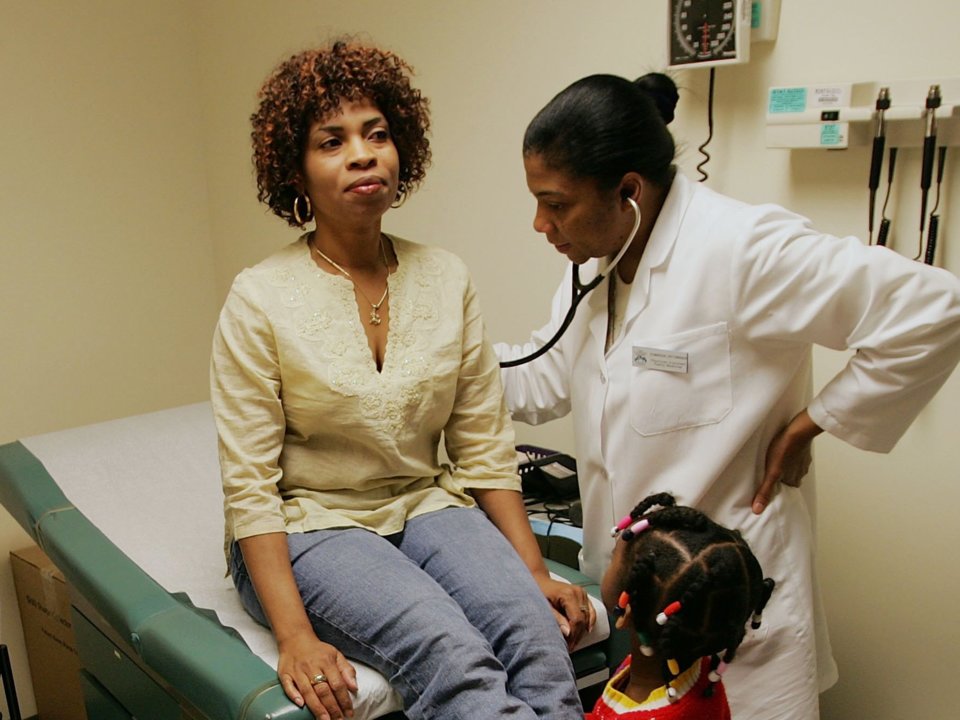
You have probably seen this quoted a gazillion times on many PA blogs and websites:
"According to the US Bureau of Labor and Statistics employment of physician assistants is projected to grow 27 percent, much faster than the average for all occupations. As demand for healthcare services grows, physician assistants will be needed to provide care to patients."
But is this true? Are PA jobs raining like men, hallelujah?
The answer is, for the most part, yes.
We are already experiencing an outsourcing of conventional jobs, a trend poised to hit a fever pitch in the coming years. There has never been a better time to consider the long-term viability of the degree you already have or the one you plan to spend a lot of time and money attaining.
During a quick search of the best PA job websites in my area, I found 45 physician assistant jobs within a 25-mile radius with an average salary of $145,470 per year.
I receive executive recruiting emails and LinkedIn messages from eager headhunters almost daily.
Now, it's not always easy to find exactly what you're looking for, especially as a new grad. I recently received a message from a frustrated PA school graduate and job applicant in New York City complaining of limited offerings. But this is the exception rather than the rule.
Compared to other professions and in light of the easing regulations and ever-increasing scope of practice for PAs, the future looks bright for the PA profession.
3. Stable, Secure Future
If you feel that your job is in jeopardy or that you’ll be unemployed in the near future, you'll naturally feel less satisfied with your work.
Stable, safe, and secure jobs are, therefore, the ones that yield the most happiness.
Number three on this list (stable and secure future) ties very closely into #2 (availability of jobs) and #4 (the ability to pay off debt). For most Americans, "stable and secure" means having all three.
Physician assistants have lots of job options, a ton of location flexibility (within the US, at least), a salary that's beating inflation, and a very bright future, even in the face of an imminent AI revolution.
Can robots replace PAs?
If you're not asking this question, you should be.
As reported by the Oxford Martin School, around 50% of all U.S. jobs are at risk of being automated and replaced by robots.
So, how do PAs fare?
According to the Replaced by Robot website, PAs will almost certainly not be replaced by robots, and we are rated #190 out of #702 with only a 14% chance of automation. That's because PAs rank high in cleverness, negotiation, and helping others.
A helpful AI will augment parts of our job, and PAs are well-positioned to thrive in such an environment. When compared to MDs, PAs may be better positioned, whereas, in the AI world, many doctors will be overtrained at best.
4. Ability to pay off debt
Ahh, PA school loan debt. The bane of the PA student's (and practicing PA's) existence. Educational debt, in my opinion, is the single greatest threat to the future success of PAs and of our profession.
Research and polling reveal that the specter of student loan debt nearly extinguishes the joy we associate with graduating from college in the first place. They discovered something else as well: a kind of “tipping point” where the accrual of personal debt shifts from “acceptable investment” to “source of existential dread” at around the $25,000 mark.
How much debt do PAs have?
According to the Physician Assistant Education Association (PAEA), new PA students plan to finance an average of 84% of their PA education, and most students predict their debt from PA school will total between $75,000 and $150,000.
This is well above the study's "acceptable investment" mark.
A loan is only a good deal if you can get a good return on your investment. In financial terms, this is called the ROI. Does PA school provide the ROI that PA students believe it does?
Is a $125,000 loan for PA school a good investment?
Let's run the numbers:
The median pay for a physician assistant is currently $50.41 per hour and $104,860 per year. When surveyed, 68% of new graduate students expect starting salaries in the $80,000 to $100,000 range.
On mapping your future's website, I used a debt-to-salary wizard based on an annual starting PA salary of $80,000. Here's what I came up with:
Based on a PA salary of
- $80,000.00 annually
- $38.46 Hourly
- $6,666.67 Monthly
You should borrow no more than a maximum of $51,580.85.
Based on an annual salary of $100,000 you should borrow no more than a maximum of $64,476.06.
How much salary do you need to support the current predicted PA school loan debt?
Based on student loan debt of $125,000 to be repaid over 10 years at 4.45 percent interest with an estimated monthly payment of $1,292.47, you should make no less than:
- $93.21 Hourly
- $16,155.87 Monthly
- $193,870.42 Annually
Wow, I don't know a whole lot of new graduate PAs making $193K per year!
The good news is that as a PA, there are many ways to tackle debt, including scholarships, grants, and loan repayment programs. I was an NHSC scholar, and because of this, I incurred only $18,000 in graduate school debt in combination with $20,000 in undergraduate loans.
5. Supervising physician relationship
Last but not least, one of the top 5 reasons people become PAs is the relationship with the supervising physician.
In other words, PAs like the idea of being supported in their decision-making by a supervising physician mentor who will be there to guide them every step of the way.
But does this happen? Are PAs always supported by a supervising physician?
In my experience? Not always.
At my first job, I was flying solo after only two months with a supervising doctor "always" a phone call away. Many times, especially while working weekends and evenings, I was the only one available for a 25-mile radius and the phone call I was promised often rang to voicemail.
It was, to be fully transparent, a bit scary.
I have spoken to many new grads and other PAs who have started new jobs where they had little support. It's normal to feel nervous as a new provider, and since PAs don't usually attend postgraduate residency and fellowship programs, it's even more important that we are surrounded by supportive team members.
But for many employers in desperate need of medical providers, this is the last thing on their mind. Doctors have little incentive in big institutions to take on uncompensated liability, and the pool of PAs in many clinics and hospitals is outpacing the hiring of doctors who can supervise
In the coming years, this will only get worse.
Final thoughts
Make work your job
Your job is what you do for money to provide shelter, clothing, and food. Your work, on the other hand, is what you do to contribute to others, the causes you are passionate about, and the good you wish to bring into this world.
When your work is also your job, you have achieved a sweet spot in life, and this can be accomplished while working as a PA
Guard Your Time
If you don't determine which activities are a good use of your time, someone else will do it for you.
It's essential for each of us to become more aware of what is truly worth the hours of our one short, important life. Guard your time ruthlessly for the things that matter most and learn to say “no” graciously to others.
Take Care of Yourself
What matters at the end of our life is not the house we lived in, the car we drove, or the possessions we purchased. What will matter in the end is how we treat others.
Keep selfless, living the goal of life. However, an empty cup cannot be poured into another. If we are going to live selfless lives (the true measure of success), we must learn that caring for ourselves is the first step in caring for others. Rest, exercise, and pursue healthy habits.
Tackle Debt Head-On
When preparing for PA school, finances should be as much a part of your plan as patient contact, prerequisites, and GPA. If done poorly, it can negatively affect the next 20-30 years of your career.
Make it your mission to squash debt and prevent it from crushing your happiness. If living with your parents and eating canned beans isn't your idea of the good life, consider loan repayment programs. Becoming an NHSC scholar was the best decision I ever made!
Further reading:
- The Balancing Act: Solving the healthcare provider work-life balance problem
- Are PAs Burned Out? Emergency Medicine PAs Have Highest Rates of Burnout
- The voice of Heath 3.0 ZdoggMD
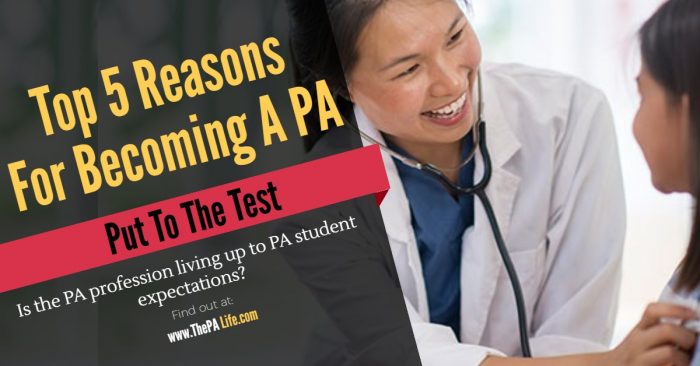
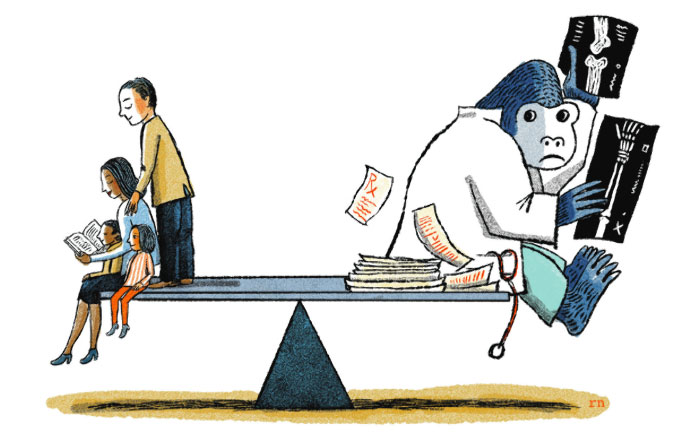
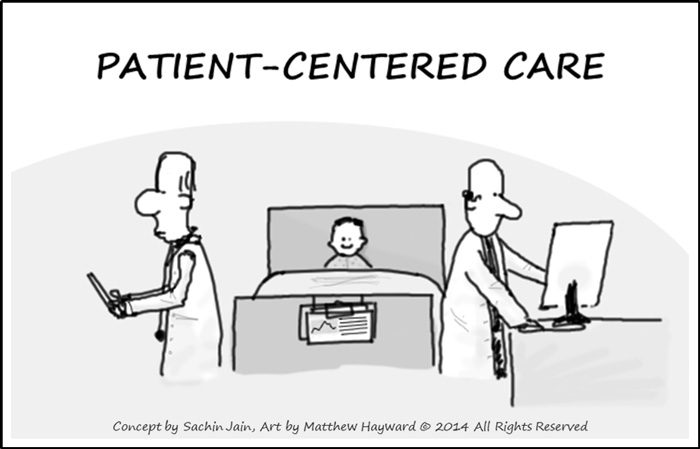
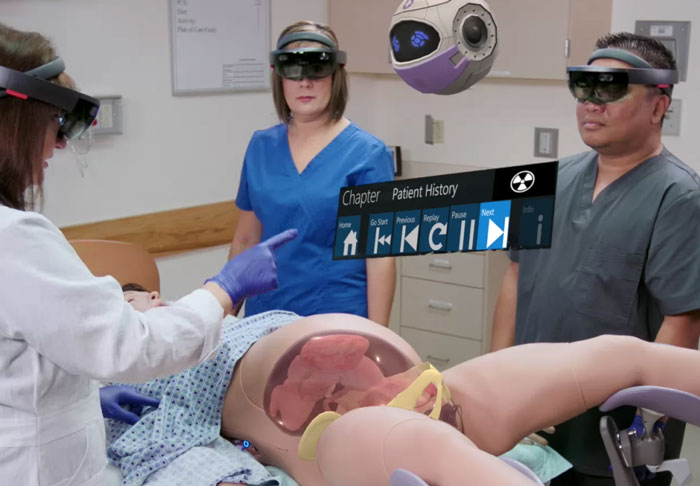

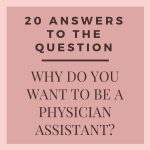














Leave a Reply